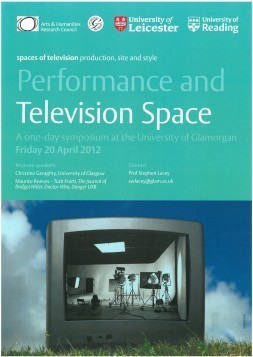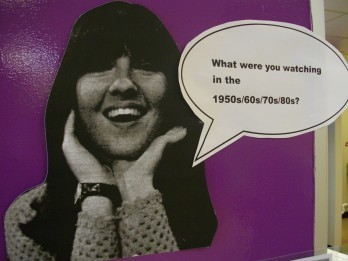As the whole world is about to discover, Britain is more than usually wet this year. As Charlie Brooker puts it, we will be trying to stage the Olympics under water. So imagine my delight at BBC One’s latest primetime miniseries *Blackout. * It’s a drama of political corruption, set in a rainsodden city dominated by Victorian buildings with a drastic shortage of lighting.

There was an eerie feeling in Mexico City’s Benito Juárez Airport on the morning of July 1 as I made my way to Guadalajara to talk about global Hollywood, greening the media, cultural citizenship, and the new right of cultural studies. Quite a mouthful.

I am currently sifting through some of the data from our 100+ interviews with television and digital media producers from the BBC, Channel 4 and the independent television and digital sector. Some of our central questions have been: what does public service broadcasting mean to those who work in the sector?

I have decided to turn over a new leaf and to stop moaning about the lack of HBO on my TV screen. It all came about last weekend when I realised that I had been carrying this bitter burden for nearly a year now. Rather than writing about US TV (which is what I have always done) I have been writing about the lack of US TV in my life.

I enjoyed Helen Wheatley’s CST blog of 25 May and found her ‘worrying at the question of what and who television history is for’ very pertinent to my own work for the research project ‘Spaces of Television: Production, Site and Style’. Therefore, in this, our project’s first guest blog for CST, I’d like to take the opportunity to ‘worry about’ my own historical methodology and offer some thoughts about the role of

A lifetime of television viewing often encourages me to make unlikely connections. Consider the wildly successful ‘Most Interesting Man in the World’ advertising campaign for Dos Equis beer (2007-present) produced by the multinational integrated marketing agency, Euro RSCG Worldwide. The first time I saw one of these adverts in the late 2000s, I must admit I was confused.

As I wrote earlier this year, my TV viewing habits have, over the past 12 months, undergone a radical change. Quality US drama series, once my favoured viewing choice, have now been moved exclusively to Sky Atlantic HD, which houses all the best TV shows direct from America and even some British ones (about which more later).

The BBC’s coverage of the Queen’s Jubilee is an example of the megaspectacle that Douglas Kellner (2003) suggests dominates contemporary life.

In a fascinating micro-study a couple of years ago, my colleague Karen Lury looked at how her neighbours were managing the digital transition (‘Close viewing: stories of technology in the move from analog to digital media’, paper to SCMS, New Orleans). This rang bells with me since I was beginning the long drawn-out stages of my own transition. I could never be accused of being an ‘early adopter’ so far as television is concerned.

Glee has almost all the elements of a perfect TV show for me: high school setting, teens bursting into song at the drop of a hat, lively dance numbers, generally up-beat storytelling, fast-paced dialogue and storylines that don’t shy away from difficult subject matter, such as homophobia and teen pregnancy. Sure, season two had been hit and miss.

I’m sure that at a certain point people are going to get bored of me worrying at the question of what and who television history is for (if they aren’t already). Speaking as someone who occasionally describes themselves as a television historian, you may see this as a form of existential angst, a near-obsessive need to examine and justify the thing that I spend the majority of my day doing.